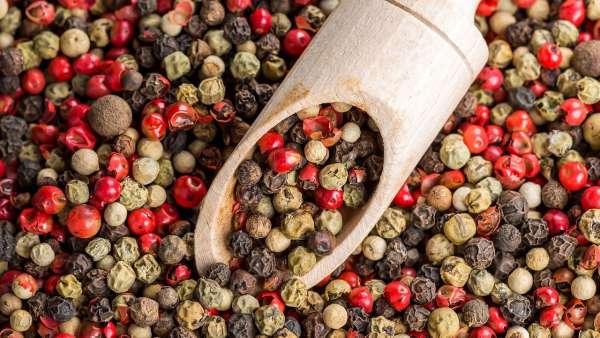Pepper
🌿Piper, king of spices

Pepper, nicknamed the king of spices, is a spice prized for its unmistakable flavor and health benefits. Rich in vitamins, minerals and antioxidants, pepper helps improve digestion, supports the immune system, fights inflammation and can help prevent serious conditions such as cancer. Discover how you can use this spice therapeutically!
🌎 Pepper (general info)
Pepper is a tropical plant whose fruits are mainly used as a spice. Thro throughout history, this spice has been extremely valuable:
- 📜 Egyptians used pepper for embalming.
- 💰 In the Middle Ages, pepper was used as currency.
- 🛳️ The pepper trade influenced the expansion of great empires.
Today, Vietnam is the largest producer of pepper, accounting for over 34% of global production. There are several types of pepper, each with specific properties and uses:
- ⚫Black pepper - the most popular, spicy and flavorful (originating from Southwest India).
- ⚪ White pepper - milder and hotter, often used in Asian cuisine (a significantly hot, mature, shelled variety of pepper).
- 🟢 Green pepper - harvested raw, pre-mature, fresh and mildly hot (commonly used in French, South American and Thai cuisines).
- 🔴 Red pepper - used in food canning ( variant often used in food preservation).
- 🎀 Pink pepper - comes from a different species and has a sweet taste (variant comes from the mastic tree, often used in nouveau cooking styles, more aromatic than spicy).
📊 Nutritional Values of Pepper (per 100g)
- 🔥 Calories: 255 kcal
- 💪 Protein: 11 g
- 🥦 Fiber: 26.5 g
- 🦴 Calcium: 437 mg
- 🔋 Potassium: 1259 mg
- 🩸 Iron: 28.9 mg
- 🛡️ Vitamin C: 21 mg
- 🧠 Vitamin B6: 0.3 mg
- 🩹 Vitamin K: 164 µg
💚 Benefits of Pepper Consumption
Pepper has a myriad of benefits for the body from both physical and mental considerations, preventing cancer, improving immunity, brain function and digestion, aiding the slimming process, treating colds and flu and detoxifying the body - while pepper can also help smokers quit nicotine.
- 🛑 Prevents cancer - It contains compounds that may reduce the risk of some types of cancer (lung, intestinal, skin).
- 🦠 Boosts immunity - Rich in vitamins and minerals, pepper helps fight infections.
- 🧠 Improves brain function - Stimulates blood circulation, reducing stress and symptoms of depression.
- 🩺 Aids digestion - Increases stomach acid production, preventing bloating and intestinal gas.
- 🔥 Boosts Metabolism - Supports fat burning and contributes to weight loss.
- 🤧 Treats colds and flu - Anti-inflammatory properties help clear secretions and reduce cough symptoms.
- 🧽 Detoxifies the body - Contains antioxidants that cleanse the body of toxins.
- 🚭 Helps smoking cessation - Inhaling pepper essential oil vapor reduces the craving for nicotine.
⚠️ Risks and Adverse Effects
- 👀 Eye irritation - Contact with pepper can cause stinging and redness.
- 😖 Gastrointestinal problems - Excessive consumption can cause stomach irritation and hemorrhoids.
🚫 Contraindications
- ❌ Gastrointestinal disorders - Not recommended for people with ulcers or irritable bowel syndrome.
- 🤰 Pregnant and lactating women - Pepper may cause discomfort to the baby through breast milk.
🏁 Conclusion
🌶️ Pepper is a superfood with amazing health benefits, as long as consumed in moderation. Whether you use it to improve digestion, boost immunity or detoxify, this spice deserves a place of honor in your kitchen! 🍽️
Comments